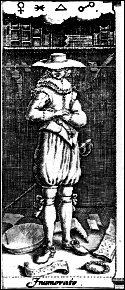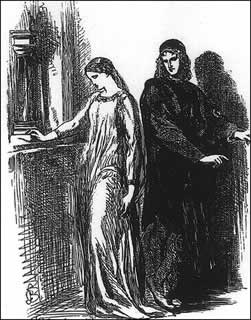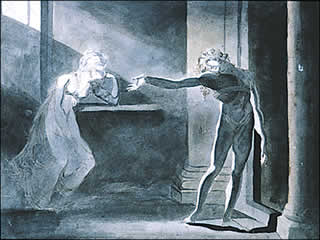
The Forlorn Lover
 |
Ith'under Columne there doth stand, Inamorato with folded hande. Downe hanges his head, terse and polite Some Dittie sure he doth endite. His lute and bookes about him lye, As symptomes of his vanity. If this doe not enough disclose, To paint him, take thy selfe by th'nose. - Robert Burton, The Anatomy of Melancholy (1632). Clarendon Press, Oxford. 1989.vi. p.lxii. |
|
His complaint is common in any age, being responsible for about a quarter
of the lyric poetry of the world. Burton had him illustrated on the
title-page of the Anatomy, where he is shown wearing a large
hat pulled down over his eyes, his hands clasped across his bosom, |
| POLONIUS: And I do think, or else this brain of mine Hunts not the trail of policy so sure As it hath used to do, that I have found The very cause of Hamlet's lunacy. KING: O, speak of that! That do I long to hear. II.ii.46-50. |
 |
With regard to the causes of Hamlet's madness, Polonius is the chief advocate of the forlorn lover theory. He hastily arrives at this theory in Act II, Scene i, when Ophelia describes her encounter with Hamlet in her sewing closet.
|
OPHELIA: My lord, as I was sewing in my closet,
Lord Hamlet, with his doublet all unbraced, No hat upon his head, his stockings fouled, Ungartered, and down-gyvèd to his ankle, Pale as his shirt, his knees knocking each other, And with a look so piteous in purport As if he had been loosèd out of hell To speak of horrors - he comes before me. POLONIUS: Mad for thy love? OPHELIA: My lord, I do not know, But truly I do fear it. POLONIUS: What said he? OPHELIA: He took me by the wrist and held me hard; Then goes he to the length of all his arm, And with his other hand thus o'er his brow He falls to such perusal of my face As 'a would draw it. Long stayed he so. At last, a little shaking of mine arm, And thrice his head thus waving up and down, He raised a sigh so piteous and profound As it did seem to shatter all his bulk And end his being. That done, he lets me go, And, with his head over his shoulder turned, He seemed to find his way without his eyes, For out o' doors he went without their helps, And to the last bended their light on me. POLONIUS: Come, go with me. I will go seek the King. This is the very ecstasy of love, Whose violent property fordoes itself And leads the will to desperate undertakings As oft as any passion under heaven That does afflict our natures. I am sorry. What, have you given him any hard words of late? OPHELIA: No, my good lord, but as you did command did repel his letters and denied His access to me. POLONIUS: That hath made him made. - II.i.77-110. |
Polonius will subsequently stick to this theory even as his and Claudius' misguided attempts to prove it fail, and we eventaully see, from Hamlet's graveside declaration at Ophelia's burial, that there is some truth to it.
 |
J. Henry Fuseli, "Hamlet and Ophelia" 1770-78,
Pen and Ink with Washes
The scene that Ophelia describes has such dramatic intensity that one wonder why Shakespeare didn't actually put it on the stage. In his production, Franco Zeffirelli, does just that. He takes the scene out of the dialogue and puts it into action. By having Polonious observe the events, he eliminates the need for Ophelia's narrative, and also adds to the paranoid feeling of a world in which everyone spies and is spied upon.
Even before Polonius presents his theory to the king, it is met with skepticism by Gertrude, who has already concluded that it is his father's recent death and the subsequent rapidity of her marriage to Claudius that has put Hamlet out of sorts. But Polonius has already developed his theory into an elaborate description of Hamlet's decline.
| And then I prescripts gave her, That she should lock herself from his resort, Admit no messengers, receive no tokens. Which done, she took the fruits of my advice, And he, repellèd, a short tale to make, Fell into a sadness, then into a fast, Thence to a watch, thence into a weakness, Thence to a lightness, and, by this declension, Into madness wherein now he raves, And all we mourn for. II.ii.142-151 |
Polonius is so certain of his assessment that he is ready (at least rhetorically) to bet his position in the Danish court on it. "If he love her not, And be not from his reason fall'n thereon, Let me be no assistant for a state But keep a farm and carters."
To test this theory, what becomes the "nunnery" scene is set up. As Claudius proclaims after that scene, the theory now seems to be destroyed. "Love? His affections do not that way tend." Nonetheless, Polonius still adheres to this supposition about the cause of Hamlet's melancholy.
| But yet do I believe The origin and commencement of his grief Spring from neglected love. III.i.179-181. |